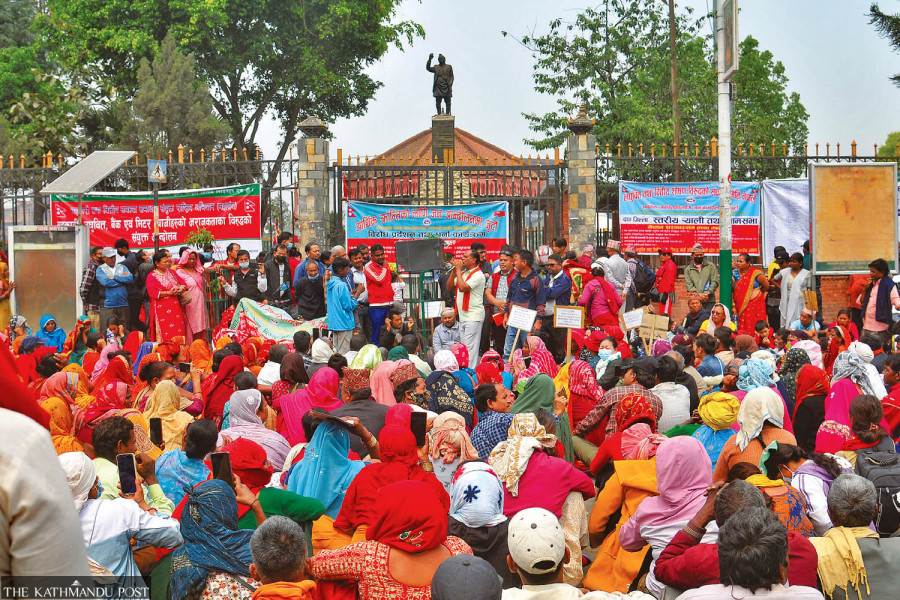National
Leaderless, new cooperatives agency fails to begin work
Three months after its establishment, the government has yet to appoint the regulatory authority’s chairperson.
Purushottam Poudel
Although the National Cooperative Regulatory Authority (NCRA) was established on January 27 through an ordinance, the much-awaited regulatory body’s future remains uncertain without the leadership.
The government had appointed Arjun Pokharel, then secretary at the Ministry of Land Management, Cooperatives and Poverty Alleviation, as the authority’s acting chairperson.
But with Pokharel retiring from government service with effect from April 15, the NCRA has been left without even an acting chief.
Though Kedarnath Sharma was appointed Secretary for the ministry on April 21, the Cabinet has yet to formally assign him the role of the authority chairperson.
The authority, formed two months ago, has not appointed its expert members as well. While inaugurating it on January 27, Minister for Land Management, Cooperatives, and Poverty Alleviation Balaram Adhikari had vowed to appoint expert members without delay.
The new cooperative law provides for a five-member board including the chairperson. An executive director from the Nepal Rastra Bank and a joint-secretary overseeing the cooperatives’ affairs at the ministry function as board members.
The government can also appoint two expert members with 10 years of experience in their respective fields—one with specialised experience in the banking or financial sector and a chartered accountant.
At present, the NCRA has only two members, said an official at the cooperatives ministry.
Of the two members, Madan Koirala represents the ministry, and Guru Prasad Paudel the central bank. With just two members, it has become impossible even to convene the authority’s meeting.
The much-anticipated institution has been unable to start its crucial function of monitoring and regulating thousands of cooperatives across the country.
Earlier, when forming the NCRA, then-secretary at the ministry, Pokharel was also considered a potential candidate for the chair as he would soon be retiring as the ministry’s secretary.
“There were discussions that Pokharel, who had been leading the cooperatives ministry for long, would be appointed the NCRA chair after retirement,” said an official at the ministry on the condition of anonymity.
But Pokharel denied the speculation. “There may have been such discussions, but appointment is no big deal. What matters is the right alignment with the government to be able to work effectively after the appointment,” he said.
Yet Pokharel said that given the right circumstances, he would love to be able to make use of his experience in the field.
Minister Adhikari said that the NCRA will soon get a new chairperson and gather momentum.
“The NCRA has formulated its procedures and it will now press ahead with consultations and suggestions,” the minister said. “We shall soon appoint a new chairperson. Until then, the new secretary at the ministry will fulfil the duties.”
Officials stress the importance of having the authority’s chair, pointing out how even the experienced Pokharel, as acting chief, could not effectively carry out his responsibilities.
With the government’s failing to appoint its chair and the assignment of the line ministry’s secretary in an ad-hoc arrangement, the authority is unable to function properly.
The authority was established after years-long protests of thousands of cooperatives victims and months-long debate in Parliament. It was envisioned as a body to monitor thousands of cooperatives across the country, regulate them and help depositors get back their savings in fraudulent cooperatives.
The Special Parliamentary Probe Committee had recommended an all-powerful authority that could remove the anomalies and irregularities in the cooperatives sector. Also, experts in the field had long advocated for a body with a strong mandate.
According to a government estimate, around three million people are members in over 34,000 cooperatives operating across the country.
The government has declared 22 cooperative institutions as problematic and is working to recover loans and to pay back depositors.
Yet there is no progress on the recovery of loans.
The mandatory establishment of a Credit Information Centre, which is vital for loan recovery, has not progressed. Although the Cooperatives Act allows for a centre to be established under the Nepal Rastra Bank Act to serve cooperative institutions, this process is stuck, said an officer at the ministry. Similarly, the setting up of a Savings and Credit Protection Fund has also not materialised.
On December 24, while issuing the ordinance on cooperatives, the government envisioned the dissolution of the National Cooperative Development Board (NCDB) and establishment of the NCRA in its stead. The ordinance has been replaced by an Act. The NCRA, a more powerful body, would focus on supervision and regulation of the cooperatives, it was said.




 25.12°C Kathmandu
25.12°C Kathmandu













